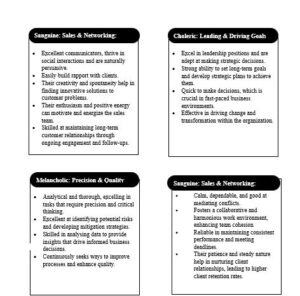I was at the office when a lady came in to sell me an endowment insurance policy. I turned her down immediately, as I already had a few insurance policies and didn’t want to take on more. However, she was persistent and continued to give me numerous reasons why I needed an extra policy. Eventually, she proposed a once-a-year lump sum payment, and after some negotiation, I found myself signing up for a quarterly payment plan, even though I really had no plans of it.
When I got home, I wondered, “How did I fall for this?” The next morning, she informed me of a challenge with processing my information: my Ghana Card had my maiden name, but my account was under my married name. I thought I was free from the policy, but I was wrong. She continued to pester me until I compelled to complete an affidavit and gazette to finalize the name regularisation process and close her deal. This experience showed me the power of influence that people with a sanguine temperament possess. A sanguine has the potential to sell someone a winter jacket in summer season.
Everyone has a unique combination of temperaments that influence how they think, feel, and behave. Managers who understand and leverage these temperaments can see significant improvements in business development and productivity. This article explores how managers in business development and sales can utilize temperaments to enhance their strategies and outcomes.
| Choleric: Ambitious, leader-like, goal-oriented | Melancholic: Detail-oriented, analytical, reserved |
| Sanguine: Enthusiastic, social, outgoing | Phlegmatic: Calm, reliable, supportive |
The Four Temperaments
Specialty of Each Temperament in Business Development and Strategy
Each of these temperaments brings unique strengths and potential challenges to the workplace. A manager’s ability to recognize these can help in assigning roles, improving team dynamics, and developing strategies to meet desired goals and objectives of the organization.

Practical Example: Marketing Department Strategy of ABC Company
Case Study: The Marketing Department in ABC Company wants to develop a business growth strategy. Here’s how each person with their unique temperament can contribute to achieve easily achieve success:
Objective: Develop a business growth strategy to increase market share and customer engagement.
Team Members:
- Kojo (Sanguine): Sales & Networking
- Kwame (Melancholic): Precision & Quality
- Adjoa (Choleric): Leading & Driving Goals
- Akosua (Phlegmatic): Stability & Support
Contributions:
Kojo (Sanguine)
- Networking & Outreach: Leverages his excellent communication skills to network with potential clients and industry influencers, expanding the company’s reach.
- Creative Campaigns: Generates innovative and engaging marketing campaign ideas to attract new customers.
- Customer Engagement: Builds and maintains strong relationships with existing clients through regular follow-ups and personalized communication.
Kwame (Melancholic)
- Market Analysis: Conducts detailed market research and analysis to identify trends, opportunities, and threats, providing data-driven insights for the strategy.
- Risk Assessment: Evaluates potential risks associated with different growth strategies and suggests mitigation plans.
- Quality Control: Ensures all marketing materials and campaigns meet high standards of quality and accuracy.
Adjoa (Choleric)
- Strategic Planning: Leads the development of the overall business growth strategy, setting clear, ambitious goals and defining actionable steps to achieve them.
- Decisive Action: Quickly makes strategic decisions and adjusts the plan as needed to respond to market changes.
- Leadership & Motivation: Inspires and drives the team towards achieving their growth objectives, ensuring everyone stays focused and motivated.
Akosua (Phlegmatic)
- Team Support: Provides stability and support within the team, ensuring a harmonious and collaborative working environment.
- Conflict Mediation: Mediates any conflicts that arise, fostering a positive atmosphere that enhances productivity.
- Client Retention: Focuses on retaining existing customers by ensuring their needs are met and addressing any concerns promptly and effectively.
Management for Success:
- Sanguine: Position sanguine individuals in roles that require frequent interaction with clients and stakeholders, such as sales, marketing, and customer service. Their enthusiasm can drive sales and build strong client relationships, leading to increased business opportunities.
- Choleric: Utilize choleric individuals in leadership and management roles where strategic planning and decision-making are crucial. Their ability to set and achieve targets can help in steering the company towards its business objectives.
- Melancholic: Assign melancholic individuals to roles that involve data analysis, quality control, and project management. Their meticulous nature ensures that projects are executed with high accuracy, contributing to the overall quality and efficiency of business operations.
- Phlegmatic: Place phlegmatic individuals in roles that require consistency and support, such as human resources, administration, and team coordination. Their reliability helps maintain a harmonious work environment and ensures that teams function smoothly.
Conclusion:
Leverage the strengths of sanguine and choleric individuals to drive sales and marketing efforts. Their combined enthusiasm and strategic thinking can help in achieving sales targets and expanding market reach.
Utilize melancholic and phlegmatic individuals to enhance operational efficiency. Their attention to detail and reliability ensure that processes are optimised and projects are executed flawlessly.
Foster a culture of innovation by encouraging collaboration between different temperaments. The diverse perspectives and approaches can lead to innovative solutions and drive business growth.
Build strong customer relationships by leveraging the social skills of sanguines and the supportive nature of phlegmatics. Their ability to connect with and support customers can lead to increased customer satisfaction and loyalty.
The writer is a Temperament Coach & Trainer, a Chartered Banker, member of the Institute of Directors, Ghana and a Lead Implementer in ISO 22301
Email: theodorasenaya@gmail .com
Tel: 00233-244385317










